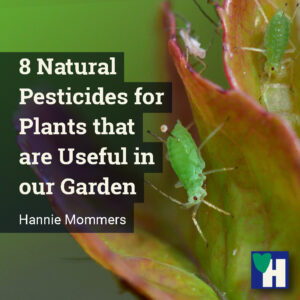
There’s no doubt, a few bugs can ruin a great garden. Yet we don’t like the idea of consuming poisons with our fruits and vegetables, so there is no way we will spray our garden with chemical pesticides.
The good news is there are several natural steps we can take to eliminate garden pests, including making our own pesticides. Here are 8 natural pesticides for plants we can make at home.
I often hear people say they don’t want to use biological and organic pesticides because they don’t work. What they mean by that is, organic pesticides don’t work instantly and they don’t kill every living bug or weed in the garden. Sustainable living demands patience and knowledge.
Some of the links are affiliate links. As an affiliate associate, we earn a commission when you purchase any of the products offered through the shared links at no extra cost for you. This helps us maintain this website.
Table of contents
Are pesticides necessary?

The answer to whether pesticides are necessary depends on who you ask. Farmers will say that over half the crop would be ruined without pesticides. However, UN food and pollution experts say this is a myth and that chemical pesticides are causing more problems than solving any.
Looking for natural pesticides that don’t harm our environment is a better option for us personally and for biodiversity. According to the UN, worldwide it’s more important to do something about poverty, inequality, and distribution to solve world hunger.
Natural prevention is the first choice
A lot of bug problems can be prevented by companion planting. Companion planting means that some plants are a natural protector of certain neighbors. And others should better not be planted next to each other.
Strong-smelling or even stinking plants, such as onions, garlic, thyme, lavender, lemongrass, and coriander are repellent to many insects and animals.
Related: Organic Companion Planting for a Healthy Kitchen Garden
Another way to prevent losing our harvest is the application of a net or gauze over the plants. Make sure that birds cannot get entangled in anything and that insects you do want, such as bees, can fly in and out.
Wood chips and straw on the bottom keep some of the insects and other unwanted animals away. Make a row of eggshells so that the sharp edges keep out slugs.
Ladybugs love aphids. Did you know that you can order the larvae of ladybugs on the internet?
Unwanted birds can be chased off with some old CDs hanging in the plants.
Natural pesticides for plants
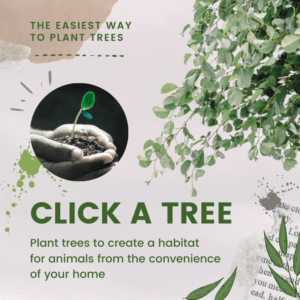
Consider whether using pesticides, even if they are organic, outweighs the risks for other animals or plants in your garden. You wouldn’t want to harm your pets and insectivores like birds, bats, and hedgehogs.
Liquid dish soap spray
This pesticide works quite well on mites for both indoor and outdoor plants. Use natural, biodegradable soaps. Mix 2 to 3 tablespoons of soap with a liter of water and put it in a spray bottle. Take care not to overuse it because it can slow the growth of fruits and vegetables. However, it is ideal for indoor household plants.
If it does not help well enough on the garden plants, add denatured alcohol to the mixture. The ratio is 20 ml soap and 20 ml denatured alcohol per liter of water.
Related: Why do you have a Soap Allergy? What are Promising Solutions?
Garlic pepper spray
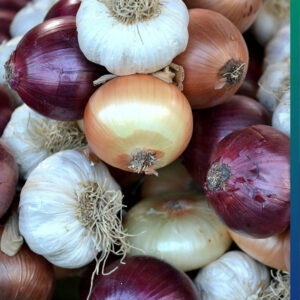
To combat slugs and a number of other insects, mix together one minced garlic bulb, one minced onion, one quart of water, a tablespoon of cayenne pepper, and a tablespoon of dish soap. Spray the vegetables to protect against bugs.
Tobacco spray
This home remedy is a bit of a problem to make for Tom and me because we are avid non-smokers. But if you have tobacco at home, boil a handful of it in water, strain it and spray the mixture over your plants.
Or if you don’t want to boil it, allow the mixture to rest for a day until it resembles weak tea. Spray on your garden vegetables. However, avoid spraying tobacco juice on your peppers, tomatoes, eggplants, or any other member of the nightshade family, as the tobacco spray can kill them as well.
Horseradish spray
A spicy horseradish spray will kill aphids, blister beetles, Colorado beetles, and whiteflies. Add two cups of diced cayenne peppers, a one-inch piece of chopped horseradish, and two cups of geranium leaves to three quarts of boiling water. Remove the mixture from the stove and let it steep for an hour. When it has cooled down well, you can spray the plants with it to get rid of the bugs.
Yarrow tea spray
Steep one cup of chopped yarrow in 1 liter of water for about a day. You can steep it in the sun in a glass container. Strain the mixture, add a cup of coffee and a ¼ teaspoon of liquid dish detergent to help the material adhere to leaves. Pour into a spray bottle and chase those pests away.
Eucalyptus essential oil
Spray a couple of drops of Eucalyptus essential oil in some water and spray your plants with it. The advantage is this doesn’t kill any insects, just chases them away. The disadvantage is the smell disappears quickly, so you have to repeat this often.
Related: The 8 Most Important Essential Oils Everyone Should Have
Antifungal remedy
A fungicide that not only keeps molds away but also unwanted bugs, is a mix of organic liquid dish soap, baking soda, and water. Like all the other mixes, put it in a spray bottle and regularly spray the infected plants with it.
Slug solution

In wet countries, slugs are a real plague. Now we’re in Spain we are hardly bothered by slugs but when we still lived in the Netherlands they ate away a lot of our crop.
We solved that by putting beer in glass containers that were half-buried in the ground. The snails are attracted to the smell of the yeast and cannot crawl back out of the jars.
When it rains, the beer is diluted too much and you will have to pour beer in the jars more often. Or to make sure there are large leaves hanging above the pot to keep out the rain.
Homemade, quick, and safe
There’s no reason to let your yard go to the bugs or use dangerous chemical pesticides. Chances are you already have the ingredients for a great bug spray at home. That’s what I like most about these natural remedies, plus the fact that most sprays can be made quickly, and they don’t harm the garden and the soil. Try one of these homemade pesticides and get rid of insects naturally.
Do you know more examples of natural pesticides? Let us know in the comment box below.

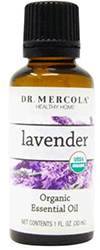
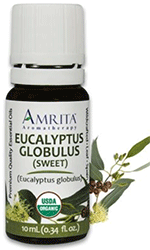
Hello Hannie, this is very important and interesting.
I’m thrilled by the fact that there are several natural steps we can take to eliminate garden pests, including making our own pesticides as you stated. I never thought that the likes of eucalyptus could be used to make pesticides, this is awesome.
I have learned much from this post, I will be making my pesticides from today.
This is very helpful, thanks for sharing.
I also don’t want to use chemical pesticides. I prefer organic pesticides. As for tobacco, I also don’t smoke, but some garden centers sell tobacco for the garden. I have used that as a natural repellent before, and it worked. I have a problem with grasshoppers during the summer, so which natural pesticide or repellent would you recommend?
Do lavender plants need a lot of water and sun or are they plants that need to be in the shade?
Hi, Christine, I was wondering whether you would use any pesticides at all, organic or not. 🙂
You have a big land, maybe you can put some chickens on it? They seem to eat grasshoppers. Although, you wouldn’t eat the eggs, would you, being vegan? Chicken manure is great for the kitchen garden as well.
Pepperspray helps, as well as garlic or soap spirit. Grasshoppers don’t like neem oil, which BTW is also good for your own skin.
Lavender needs lots of sun and doesn’t like wet feet. It’s not a problem if the soil has a bit of sand in it because that takes care of good drainage. The soil should be slightly alkaline.
Thanks so much for your questions, Christine, it’s always interesting to answer. 🙂 Take care.
I was pleasantly surprised to learn that the UN says that chemical pesticides are causing more problems than they are solving. I thought they had long ago ‘sold out’ to Big Agriculture and the chemical industries. Good to know, that they still have some integrity.
When I was growing my own gardens, 20 years ago, I was a big fan of companion planting as a deterrent to bugs. I was also of the mindset that I didn’t mind if the insects, birds, and bugs took some of what I was growing. After all, they need to eat to survive and raise families, just as we do. And seeing my garden spaces as a living healthy ecosystem was more pleasurable than just a space with one crop here, and another crop there……
I find that ‘talking with nature and cooperating with here is always far more beneficial than fighting what we consider to be pests!
There is a wonderful Australian author, Michael Roads, who had a big impact on how I now view the natural world. Some of my favorite books are from him.
“Talking with nature”
“journey into nature”
“Conscious gardening.”
Thanks for sharing 🙂
I love your mentioning of these books, Andrew, and I will definitely try to find them here as well. Like you, I don’t mind if insects and birds have their fun with our harvest as well. But at times they eat it all if they get the chance and that is less to my liking. 😉
We have a blueberry bush in the garden since last year and if we don’t put a cage over it when the berries are starting to grow, the bush will be empty before the berries are blue. 🙂 Same with the strawberries, as you can imagine.
Thanks for your tips and comment, Andrew, and stay healthy.
I like that there are natural pesticides for plants meaning no chemicals to potentially harm these plants in the future so natural remedies should always be our first choice like you rightly mentioned. These are definitely going to be safe for both plants, humans, and the environment. They are also inexpensive methods of keeping pests away.
I like the fact that these 8 natural pesticides for plants you have mentioned are easy to find and make. They are available and you won’t have a problem finding anyone there.
Unfortunately, I do not have a garden to try these wonderful methods you have listed but I have definitely shared this article with friends who will try it out.
Great article and thanks for sharing this post.
Thanks, Femi, for the compliment and the sharing. Such a pity you don’t have a garden. But if you live in an apartment building, don’t you have a balcony or maybe the roof on which you can put plants? It’s such a delight to grow a bit of green in your environment. It has so many benefits, especially in beating the stress of a big city.
Take care and stay healthy.